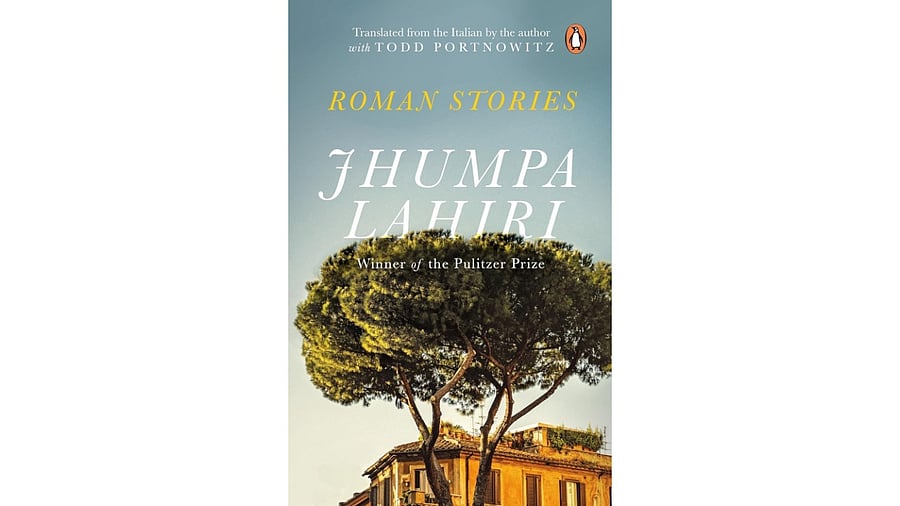
Roman Stories
Cities are made of people as much as people are made of cities. People inherit the geography of their ancestors and it shows up on their bodies — in the shape of their eyes, in the colour of their skin and in the way their tongues roll. Jhumpa Lahiri, the English-Italian writer, has mastered the art of writing about this inheritance, this generational wealth of culture, language and identity — and how one lives with it. In almost 25 years of writing, she has commemorated the migrant experience in all its forms: assimilation or acculturation, displacement, culture shocks, and more, right from her debut short-story collection, the Pulitzer Prize-winning Interpreter of Maladies (1999) to her latest, Roman Stories.
“I will always feel like an outsider wherever I am,” Jhumpa Lahiri announced in an interview last year. As an immigrant herself — born to Indian Bengali parents in London in the 1960s and having grown up in America and later, shifting to Italy — Lahiri knows a little something about being an outsider and what it means to be looked at with suspicion and fear.
In Roman Stories, she translates (quite literally) this fear and the bias that comes with it. She builds her literary empire on the stories of native Romans, tourists, professors, foreign wives, second-generation immigrants, war refugees and visiting friends. Unwelcome, discriminated against, abused, and sometimes even attacked, at work, on the street, during lunches or at home, the characters of her story balance their lives between grief and nostalgia.
There is melancholy in The Well-Lit House, desire and its accompanying guilt in P’s Parties, envy in The Boundary, a sense of longing in The Procession, and trauma in The Delivery. Their relationships with and amongst themselves are shaped by their relationship with the city and, in turn, how it treats them. They are “foreigners” — not in its affluent, exotic sense — to the strange land and always will be. The bitterness, embedded even more deeply in the new generation, like the child at the café counter in The Reentry, is both shocking and alarming. The city is bitter, angry and aggressive, and it shows, one way or the other.
Travel and the question of identity — finding, losing or recreating it — is omnipresent in Lahiri’s work. In her third short story collection — and her fourth book in Italian — her characters are nameless and almost formless, except for their defining characteristics: widowhood, motherhood, parenthood, etc. Lahiri keeps their identities hidden, as she has in most of her recent works, perhaps as a way of protecting them from readers’ assumptions; assumptions they have had their fair share of in their lives, based on their clothing, language, skin colour and facial features. The ambiguity, however, does not always work in her favour and often breaks the flow of a story. As a reader, it is hard to tell if it is intentional — a writer’s (and translator’s) choice — or an aftereffect of adapting a foreign language she now feels at home with.
Chronicling alienation
In Roman Stories, Lahiri breaks down the fabled image of abundance, romance and architectural marvels that we usually associate Italy with. She does not bother with the dolce far niente — ‘sweetness of doing nothing’ — philosophy of Italians. The Rome she writes of is far removed from the Rome we fantasise about; and distanced from its rich history and richer culture. It is not the eternal city that breathes art, food or wine. The stories, instead, are a reflection of the dark realities of racism, discrimination, intolerance and abuse, and although set in Italy, are no different than racism that plays out in the rest of Europe or America or really, anywhere else in the world. The stories can be duplicated and placed in any modern city of the world — Delhi, Mumbai, New York or Paris, making her work a true reflection of the thinning tolerance of our times.
With Roman Stories, Lahiri had the opportunity to reveal the depths of alienation and ‘othering’ that immigrants face. She does it but not as thoroughly as she could have. While she steps out of her role as a socio-cultural writer and adapts a more political undertone, she misses the mark by a clean margin. Unlike her other works, this collection is slower in delivering its message: that the search for belongingness is an isolating experience, often leading to a loss of all hope of finding a ‘home’. As the stories stretch and lengthen, the emotion and the usual charm in Lahiri’s writing fade away. Although it does make an appearance in the final story, Dante Alighieri, where a woman reminisces her past and wonders — as if on behalf of all other characters — “How long must we live to learn how to survive?”